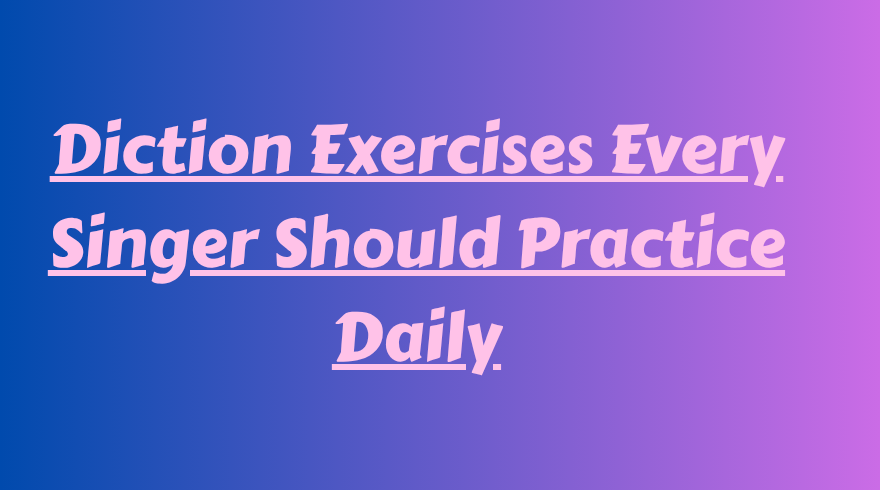Diction Exercises Every Singer Should Practice Daily

Every singer dreams of a voice that sounds clear, expressive, and professional. But one thing that often separates good singers from great ones is diction. Diction refers to how clearly and precisely you pronounce words when singing. Without it, even the best pitch or tone loses its emotional power.
Daily diction practice strengthens your vocal muscles, enhances clarity, and allows your message to connect effortlessly with your audience. The good news is that improving diction isn’t difficult—it just requires consistent and focused exercises.
1. Why Diction Matters in Singing
Good diction helps your listeners understand every lyric, ensuring your story is heard and felt. When you pronounce words clearly, you add depth and emotion to your sound. Each syllable becomes part of the music, not something that gets lost in the melody.
Clear diction also improves your tone. When your lips, tongue, and jaw move freely, your sound resonates better and feels more open. Whether you sing pop, jazz, classical, or musical theatre, proper articulation is key to delivering a confident and expressive performance.
2. Understanding the Muscles Behind Speech
Just like any instrument, your voice relies on coordinated muscle movement. The tongue, lips, jaw, and soft palate all play vital roles in shaping sound. Weak or tense muscles can make your pronunciation unclear.
That’s why consistent practice with diction exercises helps you train those muscles to move smoothly and precisely. These exercises create balance, flexibility, and strength allowing your singing voice to sound effortless and articulate.
3. Essential Daily Diction Exercises for Singers
Here are simple yet powerful exercises you can include in your daily vocal routine:
a. Tongue Twisters:
Practice tongue twisters to improve speed and control. Start slow, focusing on clarity before increasing tempo. Try phrases like:
-
“Unique New York”
-
“Red leather, yellow leather”
-
“She sells seashells by the seashore”
These drills strengthen tongue coordination and improve articulation.
b. Vowel Practice:
Sing through vowels (A, E, I, O, U) using a sustained tone. Keep your mouth open and relaxed. This improves vowel consistency and overall resonance.
c. Consonant Control:
Focus on crisp consonants by exaggerating sounds like “T,” “D,” and “K.” This helps your lyrics remain understandable, even in fast songs.
d. Jaw Relaxation:
Tension in the jaw can restrict pronunciation. Gently massage your jawline or practice silent yawning before singing to keep it loose.
4. Breathing and Diction Work Together
Breath support plays a huge role in diction. Without steady airflow, your words sound weak or rushed. Focus on diaphragmatic breathing taking deep breaths that expand your lower ribs instead of your chest.
When you combine controlled breathing with strong diction, your sound becomes powerful yet smooth. This technique also helps maintain energy throughout long performances.
5. Diction Across Different Singing Styles
Every music genre has its own approach to diction. In classical singing, precision and formality are crucial. Pop and R&B require a more natural, conversational tone. Musical theatre demands exaggerated articulation to reach the audience clearly.
Adapt your diction to fit the style you’re performing, but always prioritize clarity. A listener should understand your lyrics without reading them.
6. Recording Yourself for Improvement
One of the best ways to refine your diction is by recording your singing. Listen closely to how each word sounds. Are certain syllables unclear? Do you drop word endings?
Use what you hear to adjust your exercises and focus on weaker sounds. Over time, you’ll notice smoother phrasing, better pronunciation, and stronger tone quality.
7. Common Diction Mistakes to Avoid
-
Singing with tension in the jaw or tongue
-
Ignoring consonant endings
-
Over-pronouncing words, which sounds unnatural
-
Neglecting daily warm-ups before practicing articulation
Avoiding these mistakes keeps your tone relaxed and your lyrics clean.
Conclusion
Strong diction is a vital part of every singer’s toolkit. By practicing daily diction exercises, you’ll gain clearer pronunciation, improved tone, and more confident vocal control.
Make these exercises a regular part of your warm-up routine, stay patient, and listen to your progress. In time, your singing will not only sound professional but also connect emotionally with every listener. Precision, clarity, and control are what truly make your voice unforgettable.
- Art
- Causes
- Crafts
- Dance
- Drinks
- Film
- Fitness
- Food
- Jocuri
- Gardening
- Health
- Home
- Literature
- Music
- Networking
- Alte
- Party
- Religion
- Shopping
- Sports
- Theater
- Wellness



